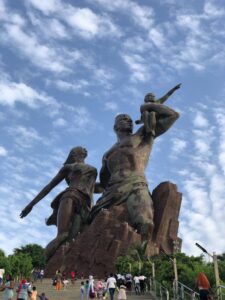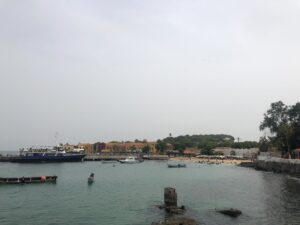By: Quintin Jepson, Researcher II
In a surprise first-round victory, the opposition candidate, Bassirou Diomaye Faye, decisively defeated the establishment party’s candidate with over 55% of the vote after a mere 10-day campaign1. Just weeks prior to Faye’s victory, it was uncertain that a presidential election in Senegal would occur at all. Then-incumbent president, Macky Sall, ordered the elections to be delayed on February 5, just three weeks before they were to be held. Many considered the move an attempt to protect his chosen candidate, Amadou Ba. However, on February 15, the constitutional court ordered the election to be held before April 2, the end of Macky Sall’s term2. The election was held on March 24, and Bassirou Diomaye Faye was sworn in as the youngest elected leader in Africa on April 2, 2024.
Faye’s ascendance demonstrates a profound victory for democracy and constitutional rule not only for Senegal but also for West Africa, where a slate of coups and a growing disregard for term limits has arrested democracy3. The peaceful transition of power solidifies Senegal’s reputation as a model democracy despite Macky Sall’s attempts to delay the election. ORB’s AI-powered online forum conducted three weeks prior to the election sheds light on how Senegal’s democracy survived the crisis.

Photo 1: The African Renaissance Monument
Democracy as a National Identity
ORB guided 100 Senegalese participants from all over the country through a series of questions regarding the state of democracy in Senegal the week of February 25. Overall, ORB found that Senegalese participants saw democracy not just as a means of governance, but as a crucial component to Senegalese identity. ORB found four key factors that fuel this Senegalese democratic identity. These factors include participants’ pride in Senegal’s democratic institutions and their attachment to constitutional rule. Additionally, participants’ eagerness to participate in elections and their belief that their actions could affect political change contributed to the strength of Senegal’s democracy.
“We are a democratic people with strong institutions our model of democracy is a benchmark throughout West Africa.”
-Female, 30 years or older, Dakar
First, participants took pride in the fact that Senegal has an exceptionally stable democracy in comparison to its regional counterparts. The historical record affirms this — Senegal has a long history of peaceful transfers of power, a unique case in West Africa4. Participants stated and reaffirmed that Senegal is and will remain a democracy; they expressed pride in the democratic institutions that the Senegalese people have built. This pride, incidentally, causes many participants to reject authoritarian forms of governance.
“Senegal is not a country like others, and our democracy has evolved year by year to what it is today ”
-Male, 18-29 years old, Dakar
Second, participants saw constitutional rule as a cornerstone of Senegalese governance; many participants saw the constitution as protecting rights critical to the Senegalese identity. While neighboring countries’ leaders have disregarded constitutional rule by reversing term limits and extending the powers of the executive5, our participants indicated that Senegal continues to frame its political goals by its constitution. This explains Senegalese resistance to any perceived attempt to undermine the Senegalese constitution.
“Respect for the constitution takes precedence over all political affiliations.”
-Male, 30 years or older, Matam

Photo 2: Boats off the coast of Senegal.
Third, participants saw voting as an essential right to exercise as a citizen and expressed great enthusiasm to participate in elections. ORB found that 86% of our participants expressed a great desire to vote in the then-upcoming presidential election. This level of enthusiasm for participation demonstrates the vibrancy of Senegal’s democracy and the importance of elections in participants’ ideas of Senegal’s governance. In fact, the election saw a 61% voter turnout6. This was an exceptionally high turnout rate compared to some of its West African neighbors like Nigeria, who had a 26% voter turnout last year7.
“Above all, I am a citizen, so voting is a right I must exercise.”
-Male, 30 years or older, Dakar
Fourth, participants believed that actions could result in a political change. In addition to the desire to participate in elections, ORB found that participants believed the protests could force the government to obey constitutionally mandated term limits and hold the election in a reasonable time frame. So far, some of these sentiments have proven true—Macky Sall affirmed his resignation at the end of his mandate, and the courts declared the electoral delay unconstitutional. These were wins partially delivered by pressure from public protests. This indicates that the Senegalese public expects their voice and vote to matter and that Senegalese leaders have so far responded to public demonstration in their decisions.
“With the protesters rebelling, political leaders will see that the people are very angry and will take steps to remedy the situation.”
-Male, 18-29 years old, Dakar
Conclusion
Despite the regional trends towards authoritarianism, Senegalese democratic stability remains strong, largely due to Senegalese democratic identity. Forum participants expressed pride, faith, hope, and eagerness toward their democratic institutions. They reveal a strong democratic culture built by a public that expects constitutional order and is maintained by leaders that listen to these demands. This strong, mutual relationship between the public and political leaders has sustained Senegal as a regional light for democracy. This strength demonstrates a path forward for other West African democracies: a reciprocal relationship between leaders and the public can strengthen democratic institutions for the benefit of the country and provide a stable and peaceful means to transfer power in periods of crisis.
______________________________________
1 Senegal President Bassirou Diomaye Faye Takes Office and Promises Change | The New York Times
2 Senegal Court Rules Government’s Postponement of Feb. 25 Presidential Poll Was Illegal | France 24
3 By the Numbers: Coups in Africa | Voice of America
4 Senegal, a West African exception amid the coups | Africanews
5 Term Limit Evasions and Coups: Two Sides of the Same Coin | Africa Center for Strategic Studies
6 Conseil Constitutionnel : Bassirou Diomaye Faye, proclamé officiellement Président de la République du Sénégal | Xalimasn
7 Nigeria’s Curious Voter Turnout Problem | African Arguments
